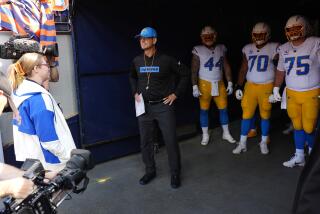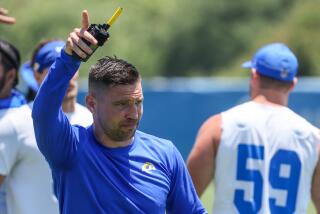Even Legends Pay the Price of Rage
In the football business, there linger two storied men from another time. They may not be the best coaches in the National Football League anymore, if they ever were. But they are the best legends by far. As a matter of surprising fact, they are the only ones left.
The sight of Mike Ditka is becoming uncomfortable and worrisome. Similarly, it is hard to observe Don Shula at the moment without smiling. What becomes a legend most? Why, winning, of course. But, then, something else.
Scarcely more than 50, Ditka cuts a far older figure in Chicago, where everything around the Bears inevitably gets entwined in antiquity. Actually he is from Aliquippa, Pa. His people came out of the Ukraine. A few years ago, when Ditka determined to rechristen himself and all of the Bears players “Grabowski,” he could have said Nagurski, because they are eternally related to Bronko and Red Grange and Bulldog Turner and George McAfee and Sid Luckman and Doug Atkins and Gale Sayers and Dick Butkus and, most of all, George Halas.
With one foot propped up on the running board of a Hupmobile in Canton, Ohio, Halas began to invent the NFL in 1920. As the MVP of a Rose Bowl and a right fielder for the New York Yankees, he was the line that intersected Jim Thorpe and Babe Ruth. Halas was American sports.
His essential glory came and went in the 1940s, but Halas stayed and stayed. In 1963, thanks to Ditka and a few ‘40s flashbacks, the old man had a last dance. Twenty years later, when he was 88 and dying, Halas reached back into his memory for a prehistoric football player and charged Ditka with restoring the mood. In 1985 the Monsters of the Midway thumped the league just like old times, and Ditka achieved sainthood in Chicago.
As a player, he had been the type who challenged teammates physically if need be, who pinned them on the locker room wall when they fell short of his standards. As much as the era will allow, he has been that kind of coach too--raving at Jim Harbaugh, raging at the media--although, increasingly, he seems to have himself pinned on that wall.
The effects of too long a playing career can show in a heart-breaking limp. The effects of too long a coaching career can show in a heart-stopping electrocardiogram, or an autopsy. A dying breed is a charming concept. A dying man is not. Chicago needs a new football coach.
Shula is also a pup out of a pioneer: Paul Brown. In 1951 two defensive backs from John Carroll College were all the rookies the champion Cleveland Browns required. Don Shula made the team proper, Carl Taseff the taxi squad.
Brown, who put the classroom in professional football, had an icy demeanor that daunted even the most grizzled veterans. In his business suit on the sideline, he resembled a homicide inspector viewing the body. Despite his ordered mind, Brown was having difficulty in the early season distinguishing Shula from Taseff.
“Nice tackle, Taseff!” Brown barked at practice one day as the mastodon Marion Motley went tumbling backward.
“The name is SHULA,” Motley’s tackler leaped up to announce. “S-H-U-L-A!” A quiet came over the field like a nuclear winter. It literally put Otto Graham in mind of the end of the world. The shivering players waited for the ground to open up and swallow their irreparable rookie.
After an interminable moment, Brown chuckled and said: “I’ll try to remember.”
A few years later, when Shula was a fringe player in Baltimore, Coach Weeb Ewbank made him learn the offensive plays as well and stand by as an emergency quarterback. Unfortunately, after Shula became the boy head coach of the ‘60s, Johnny Unitas continued to regard him as a third-string QB.
Twice Shula’s Colts were lopsided favorites to win the championship game, and twice they lost badly. The second time, when they even bowed to a lesser league in 1969, Shula became the epitome of The Man Who Couldn’t Win The Big One.
His mistake in the Joe Namath Super Bowl may have been sticking with backup quarterback Earl Morrall, who had come on for the injured Unitas to be MVP of the league. Improbably, Shula was allowed to relive that decision upon shifting to the Miami Dolphins in the early ‘70s.
Bob Griese fell this time; good old Morrall replaced him. Behind Morrall, the Dolphins won absolutely every game they played. But the second Griese recovered, he returned to the lineup and topped off the perfect season with a Super Bowl victory over the Redskins. That was 20 years ago. The Dolphins won the next season too.
Ten years ago Shula lost the Super Bowl to the Redskins. Five years ago he heard people say the game was passing him by.
He cajoles when he has Unitas. He patches when he has Morrall. He runs when he has Larry Csonka. He passes when he has Dan Marino. And somehow, going 30 years in a profession that chews men up in 10, he survives. He loses his wife. He weeps and goes on. He brings his son into the fraternity of coaching. He weeps and goes on.
Halas, Brown, Shula, Dit . . . No, stop at Shula.
More to Read
Go beyond the scoreboard
Get the latest on L.A.'s teams in the daily Sports Report newsletter.
You may occasionally receive promotional content from the Los Angeles Times.










